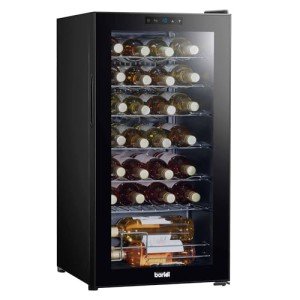The Comprehensive Guide to Refrigerators in the UK
Fridges are an essential home appliance in every home, serving an important role in food conservation and safety. The UK market provides a varied variety of fridge types, sizes, functions, and brands. This article intends to offer a thorough understanding of fridges available in the UK, including their functions, energy performance, and elements to consider when making a purchase.
Kinds Of Refrigerators Available in the UK
When looking for a refrigerator, it is very important to understand the numerous types available. Each type comes with its own set of features and functions, dealing with various needs and choices. The most common types of refrigerators found in the UK consist of:
1. Leading Freezer Refrigerators
- Description: The traditional design, featuring the freezer compartment on top.
- Pros: More budget-friendly, roomy, simple access to fresh food.
- Cons: Limited freezer area, the top may be less hassle-free for bulk items.
2. Bottom Freezer Refrigerators
- Description: Freezer lies at the bottom, enabling easier access to fresh food.
- Pros: Greater convenience, better visibility of fresh products.
- Cons: Usually more pricey, some might battle with big frozen products.
3. Side-by-Side Refrigerators
- Description: Features two vertical compartments, one for the fridge and one for the freezer.
- Pros: Ample storage area, easy to gain access to both frozen and fresh foods.
- Cons: Wider footprint, they may not fit in smaller sized cooking areas.
4. French Door Refrigerators
- Description: Combines features of bottom freezers and side-by-sides, with 2 doors for the fridge on top.
- Pros: Stylish style, large, and typically includes advanced features.
- Cons: Higher cost point, lines up inadequately with smaller sized cooking area designs.
5. Compact Refrigerators
- Description: Smaller models created for limited spaces.
- Pros: Ideal for studio apartments or offices, energy-efficient.
- Cons: Limited storage capacity, might do not have functions.
6. Integrated Refrigerators
- Description: Designed to mix seamlessly with cooking area cabinets.
- Pros: Custom fit, aesthetic appeal, increases home worth.
- Cons: Higher cost, may provide less versatility in positioning.
7. Smart Refrigerators
- Description: Equipped with Wi-Fi and wise innovation features.
- Pros: Advanced features like touch screens and internal video cameras.
- Cons: Expensive, more complex to repair.
| Refrigerator Type | Accessibility | Typical Price Range | Energy Efficiency |
|---|---|---|---|
| Top Freezer | Moderate | ₤ 300 - ₤ 600 | Average |
| Bottom Freezer | High | ₤ 400 - ₤ 800 | Above Average |
| Side-by-Side | Easy | ₤ 800 - ₤ 1500 | Varies |
| French Door | High | ₤ 800 - ₤ 2000 | High |
| Compact | Minimal | ₤ 200 - ₤ 500 | Average |
| Integrated | Custom | ₤ 1000 - ₤ 2500 | High |
| Smart | Variable | ₤ 1200+ | High |
Key Features to Consider
- Energy Efficiency: Look for models that are energy-efficient. In the UK, appliances are rated from A (most effective) to G (least efficient). An A+ score and above can lead to substantial energy cost savings.
- Capability: Choose a fridge with adequate capacity for your household. A standard guideline is 100-200 liters per individual.
- Noise Level: Consider designs that operate silently, specifically if the cooking area is near living areas.
- Cooling Technology: Features like frost-free technology are worth the investment, as they reduce maintenance.
- Adjustable Shelves: Having adjustable racks improves the flexibility to keep bigger items.
- Temperature level Control: Check for user friendly temperature controls and zones for various types of food.
- Style: Choose the style and color that matches your kitchen area visual, whether you prefer a modern stainless steel look or a traditional retro surface.
Purchasing Tips
- Determine Your Needs: Consider your cooking habits, family size, and kitchen space.
- Set a Budget: Refrigerators been available in different price varieties. Develop a budget before you begin shopping.
- Research Study Energy Ratings: Invest in energy-efficient designs to save money on energy costs.
- Check out Reviews: User experiences can provide insights into dependability and efficiency.
- Compare Brands: Some brand names are understood for their durability while others may provide more innovative features.
Regularly Asked Questions (FAQs)
1. For how long do refrigerators normally last?
- Fridges generally last in between 10 to 20 years, depending upon the brand and how well they are kept.
2. Exist any maintenance ideas for prolonging the life of a refrigerator?
- Regularly tidy the coils, check the door seals, and periodically defrost if necessary to maintain ideal performance.
3. What is the best size refrigerator for a household of four?
- For a household of four, a refrigerator with a capacity of around 400-600 liters is generally enough.
4. Do shariah.top require to stress over energy intake when purchasing a refrigerator?
- Yes, energy intake is necessary. Try to find units with high energy effectiveness ratings to minimize regular monthly costs.
5. Should I choose a fridge with a water and ice dispenser?
- This function can be practical, specifically for families. However, it might need more maintenance than basic designs.
Getting a refrigerator is a substantial decision for any household in the UK. With various types readily available, each with its unique features and advantages, it is vital to assess specific requirements before deciding. By considering factors such as energy effectiveness, capability, and style visual appeals, customers can choose a fridge that aligns well with their lifestyle, eventually improving their kitchen area experience while securing food quality and freshness.

